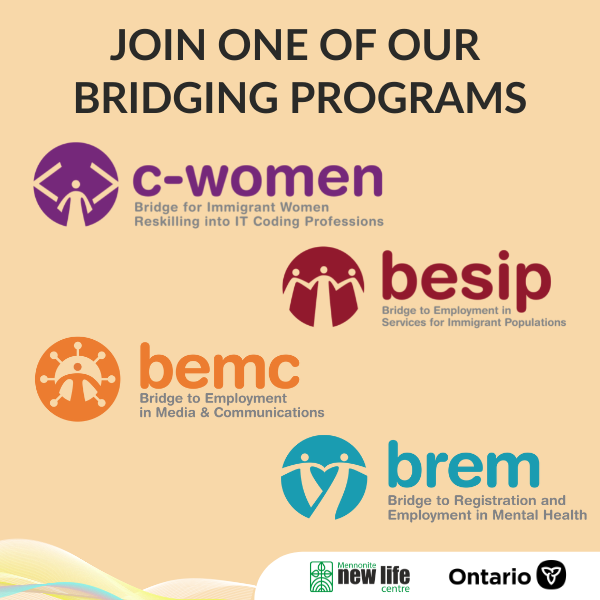The Mennonite New Life Centre of Toronto (MNLCT) will expand its newcomer settlement and integration services with the announcement of two new employment support programs.

The Bridge for Immigrant Women Reskilling into IT Professions (C-Women) Program aims to support immigrants who identify as women or non-binary with different professional backgrounds in accessing and succeeding in high-demand and high-paying careers in IT – developing apps, websites, software, databases, cloud, and more – regardless of their previous education or experience.

The Bridge to Employment in Services for Immigrant Populations (BESIP) Program provides internationally educated professionals (IEPs) with entry to high-demand jobs such as Settlement Counsellor, Employment Counsellor, Service Navigator, Program Coordinator. By the end of the program, participants will have a career advancement plan to progressive positions in their field of interest.


C-Women and BESIP build on the success of the two bridging programs already run by MNLCT— Bridge to Employment in Media, Marketing, and Communication (BEMC) and Bridge to Registration and Employment in Mental Health (BREM) —which have also received new funding.
The C-Women, BESIP, and BEMC programs start their classes on March 28th, 2022. The BREM program classes started in February. All programs are available across Ontario and will offer new cohorts in Fall 2022.

Through the Ontario Bridge Training Program, the Government of Ontario is investing $67 million over three years on programs and services that connect internationally trained immigrants with in-demand jobs in their communities.
“Ontario welcomes tens of thousands of new Canadians each year, but all too often, new immigrants struggle to find jobs in their field,” said Monte McNaughton, Minister of Labour Training and Skills Development. “Our government is proud to help internationally-trained immigrants through bridging programs like these, which help newcomers match and upgrade their skills and experience to meet the needs of local employers.”
Historically, MNLCT bridging programs have had a high Social Return on Investment – for every $1 of program funding, $7 worth of socio-economic value in the community can be expected. This includes improvements in employment, housing, community networks, health and well-being, and more.
“Bridging programs are an important tool for immigrant professionals to honour their existing education and experience while gaining an understanding of the local labour market.” – Shelly D’Mello, Executive Director, Mennonite New Life Centre
“Our participants report expanded professional networks, improved subject matter expertise and communication skills, and increased confidence in applying for jobs and attending interviews, all of which contribute to them achieving their career and life goals. The fact that three quarters of graduates obtain meaningful employment within a relatively short period of time, one year post-program, drives home the value of bridging programs for the participants and for our communities,” continues D’Mello.
Statistics Canada projects that by 2036, immigrants and second-generation individuals together could represent nearly one person in two in Canada, and approximately one third of Ontarians could have neither English nor French as their mother tongue (up from 25% in 2011). An increase in other diversity indicators like immigrant’s birthplace, visible minority status, and religion is also expected. More diversity within the population will call for an increased number of culturally competent professionals across the human services sector, a demand that the BESIP Program will help address.
The C-Women Program will tackle the underrepresentation of women in STEM occupations, which has attracted considerable attention over the last several decades. Statistics Canada data shows that in 2016, women made up only 23% of science and technology workers among Canadians aged 25 to 64. This shortage is widely recognized as detrimental to women, since science and technology occupations, particularly in engineering and computer science, are among the highest-paying and fastest-growing occupations.
Since 2009, MNLCT has guided hundreds of immigrant professionals into meaningful employment in the Canadian labour market, with more than 85% of bridging program graduates employed in their chosen fields. Its bridging programs offer newcomers an understanding of Canadian work culture and further training and education in the context of their respective professions. Participants have access to career coaching and networking to help them develop a career plan. The programs work with employers, professional associations, universities, and regulatory bodies to offer specialized courses led by subject matter experts and to help newcomers secure a position that matches their education, credentials, and experience.
BREM began in 2009 as a pathway for internationally trained mental health professionals to bring their skills, experience, and cultural competencies to the field in Ontario, thus supporting both the practitioner and the diverse communities they serve. In 2017, after the establishment of the College of Registered Psychotherapists of Ontario (CRPO), BREM began offering a program stream designed to bridge participants to licensure; those who successfully complete the Registration Stream may become Registered Psychotherapists (Qualifying). To date, 70 BREM alumni are registered with CRPO, with more in the process.
BEMC started in 2017 to support internationally trained journalists, website designers, and public relations, media, and communications professionals in navigating the Ontario media landscape and accessing meaningful employment or entrepreneurship opportunities. Graduates have gone on to use their new skills and unique perspectives in media companies both large and small; in corporate communications departments outside of the media sector; in non-profit organizations; and in starting their own successful businesses.
About the Mennonite New Life Centre of Toronto (MNLCT):

The MNLCT has been serving newcomers for 38 years, founded by local Mennonite churches with a vision of service and solidarity with refugees and displaced peoples. Today the organization helps make Canada home for over 4,000 immigrants and refugees annually through programs and services including language instruction, settlement and employment support, community mental health counselling, and counter-human trafficking services. Programs are constantly evolving to meet the needs of an ever-changing immigrant population.
For more about MNLCT’s bridging programs, visit: mnlct.org/bridgingprograms
For more information or to arrange an interview, please contact:
Tracy Docheff, Communications Manager
Mennonite New Life Centre of Toronto
- tdocheff@mnlct.org
- (647) 812-1332 ext. 5014






